Between monitoring your blood sugar, taking your insulin shots, meal planning and following a strict exercise regimen, it may feel like managing your diabetes is a fulltime job. Living with a chronic condition is difficult and can take a toll on you mentally and emotionally. It can even affect your relationships, negatively impact your quality of life and make you prone to depression. Many patients suffer from what is called diabetes burnout. This is a feeling of being exhausted and overwhelmed. It is important that you take care of your mental health along with your physical health when you have diabetes. Of course, this is easier said than done. Many of us don’t have the tools to deal with the emotional and mental upheavals that come with diabetes. These tips might be helpful to tackle that mental health journey.
Seek Out Professional Mental Health Practitioners
There is no shame in looking for a trained professional who can guide you on your journey with diabetes. Depending on the state of your mental health, a doctor can suggest group therapy, couples counseling or even provide you with tools to cope with stress and anxiety.
Learn How To Identify And Examine Your Feelings
Diabetes can unleash a host of exhausting emotions in you. You may feel anger when you get diagnosed, or you might experience a feeling of loss or sadness. Many people also display a sense of denial about their condition and resist making lifestyle changes that are good for them. It’s important to identify what you’re feeling and trace it down to the source. If you’re angry, try asking what you’re angry about. You might find that you’re really angry because of the loss of control or fear. Once you know the source of your emotion you can start working on letting it go or transcending it. Many people find journaling their emotions or talking to people with similar experiences helpful in identifying their emotions.
Learn To Recognize The Signs Of Depression And Seek Help Immediately
Detecting depression is not easy. It is less a feeling of sadness and more a sort of emotional flatlining that doesn’t go away. Some signs that you are depressed are a loss of interest in things, change in sleep patterns, having trouble concentrating, entertaining suicidal thoughts, withdrawing from relationships or experiencing a loss of energy.

